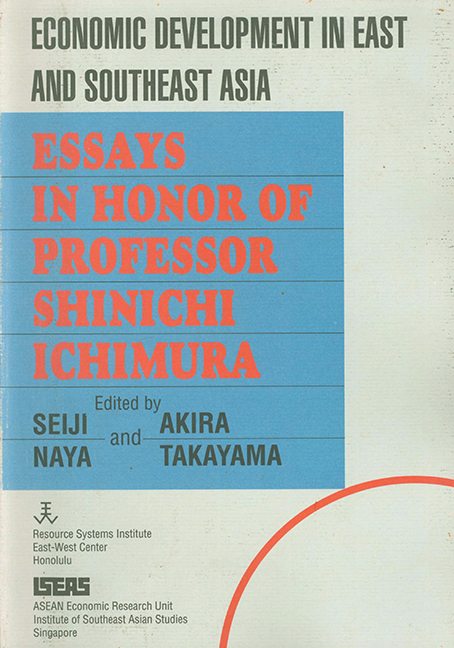Book contents
- Frontmatter
- Preface
- Shinichi Ichimura, 1925-
- CONTENTS
- Introduction
- Contributors to This Volume
- I Structural Change and Economic Development in Developing Asia in the 1990s
- II Explaining the Success of the Four Little Dragons: A Survey
- III Taiwan's Economic Miracle: A Singaporean Perspective
- IV Singapore's Experience of Industrial Restructuring: Lessons for the Other Asian NIEs
- V Korean Industrial Policies for Declining Industries
- VI Vietnam: Recent Economic Developments and the World Economy
- VII Transition from Import Substitution to Export Expansion: The Thai Experience
- VIII Adjustment Problems of a Small Oil-Exporting Country: Did Indonesia Suffer from the Dutch Disease?
- IX A Quarterly Econometric Model of the Hong Kong Economy
- X The Effect ofRicardian Rent Extracting on Macroeconomic Performance
- XI Direct Foreign Investment and the Economic Development of Korea
- XII Japanese Investment in Thailand: Looking Back and Into the Future
- XIII The Effects of Direct Foreign Investment on Taiwan: A Macroeconometric Investigation
- XIV A Reform of the Foward Foreign Exchange Market and Foreign Exchange Rate Determination Policy in Korea, with Foreign Exchange Policy Experiences of Taiwan
- XV Interest Rate and Foreign Exchange Liberalization in Taiwan in the 1980
- XVI Manifold Dilemmas behind External Debt Management
- XVII Agricultural Growth and Food Imports in Developing Countries: A Reexamination
- XVIII The Transformation of Rural Asia and Economic Development Theory and Policy
- XIX The ASEAN Summit and ASEAN Economic Cooperation
- XX The Role of Developing Countries in the New GATT Round
- XXI The Emerging Global Economy and the Role of the Asian NIEs
- Index
II - Explaining the Success of the Four Little Dragons: A Survey
Published online by Cambridge University Press: 21 October 2015
- Frontmatter
- Preface
- Shinichi Ichimura, 1925-
- CONTENTS
- Introduction
- Contributors to This Volume
- I Structural Change and Economic Development in Developing Asia in the 1990s
- II Explaining the Success of the Four Little Dragons: A Survey
- III Taiwan's Economic Miracle: A Singaporean Perspective
- IV Singapore's Experience of Industrial Restructuring: Lessons for the Other Asian NIEs
- V Korean Industrial Policies for Declining Industries
- VI Vietnam: Recent Economic Developments and the World Economy
- VII Transition from Import Substitution to Export Expansion: The Thai Experience
- VIII Adjustment Problems of a Small Oil-Exporting Country: Did Indonesia Suffer from the Dutch Disease?
- IX A Quarterly Econometric Model of the Hong Kong Economy
- X The Effect ofRicardian Rent Extracting on Macroeconomic Performance
- XI Direct Foreign Investment and the Economic Development of Korea
- XII Japanese Investment in Thailand: Looking Back and Into the Future
- XIII The Effects of Direct Foreign Investment on Taiwan: A Macroeconometric Investigation
- XIV A Reform of the Foward Foreign Exchange Market and Foreign Exchange Rate Determination Policy in Korea, with Foreign Exchange Policy Experiences of Taiwan
- XV Interest Rate and Foreign Exchange Liberalization in Taiwan in the 1980
- XVI Manifold Dilemmas behind External Debt Management
- XVII Agricultural Growth and Food Imports in Developing Countries: A Reexamination
- XVIII The Transformation of Rural Asia and Economic Development Theory and Policy
- XIX The ASEAN Summit and ASEAN Economic Cooperation
- XX The Role of Developing Countries in the New GATT Round
- XXI The Emerging Global Economy and the Role of the Asian NIEs
- Index
Summary
Introduction
The literature explaining the success of the Asian four little Dragons — Korea, Taiwan, Hong Kong and Singapore — is immense, even though the phenomenon is of relatively recent origin. There have been many thousands of books and articles by economists, management theorists, political scientists, sociologists, anthropologists and assorted journalists, that seek to explain the Asian economic miracle. Perhaps because the subject is too important to be left to economists, noneconomists have played a major role in trying to unravel the mystery. An eminent sociologist explains the attraction: “An art collector will naturally be drawn to Florence, a mountain climber to the Himalayas. In very much the same -way a social scientist interested in modernization will have his attention fixed on East Asia, to the point where he may reasonably conclude that this is the most interesting region in the world today” (Berger and Hsiao 1988, p. 3).
The success of these four Asian economies are of considerable popular interest, and, in recent years, journalists have been major contributors to the debate. The London Financial Times, for example, recently published a 12-page 40,000-word survey of the four Dragons (Housego 1988), and the Economist Intelligence Unit devoted an issue to a survey of China, Japan, and the Asian NIEs (EIU 1988).
Obviously, it is impossible to survey more than a minute fraction of this literature. However, we can touch on most of the highspots, direct our attention to a few central questions, and, wherever possible, refer the reader to existing surveys and substantive bibliographies. To provide a focus to the survey, attention is directed to a few interrelated questions: How is success explained and how satisfactory are the explanations? Tb what extent can success be attributed to the policies that were adopted rather than to other factors? Are there lessons for other developing countries? The easiest, if not the most original, approach is chronological.
The Years 1960-69
Around 1960 the four Dragons began to breathe fire, but the economists of the day were looking in other directions. In the early 1960s, Rosenstein-Rodan (1961) peered 15 years into the future and predicted that by 1976 Sri Lanka would have a higher per capita income than either Taiwan or Korea, where the average income would be barely 20 percent higher than that of India.
- Type
- Chapter
- Information
- Economic Development in East and Southeast AsiaEssays in Honor of Professor Shinichi Ichimura, pp. 20 - 37Publisher: ISEAS–Yusof Ishak InstitutePrint publication year: 1990



